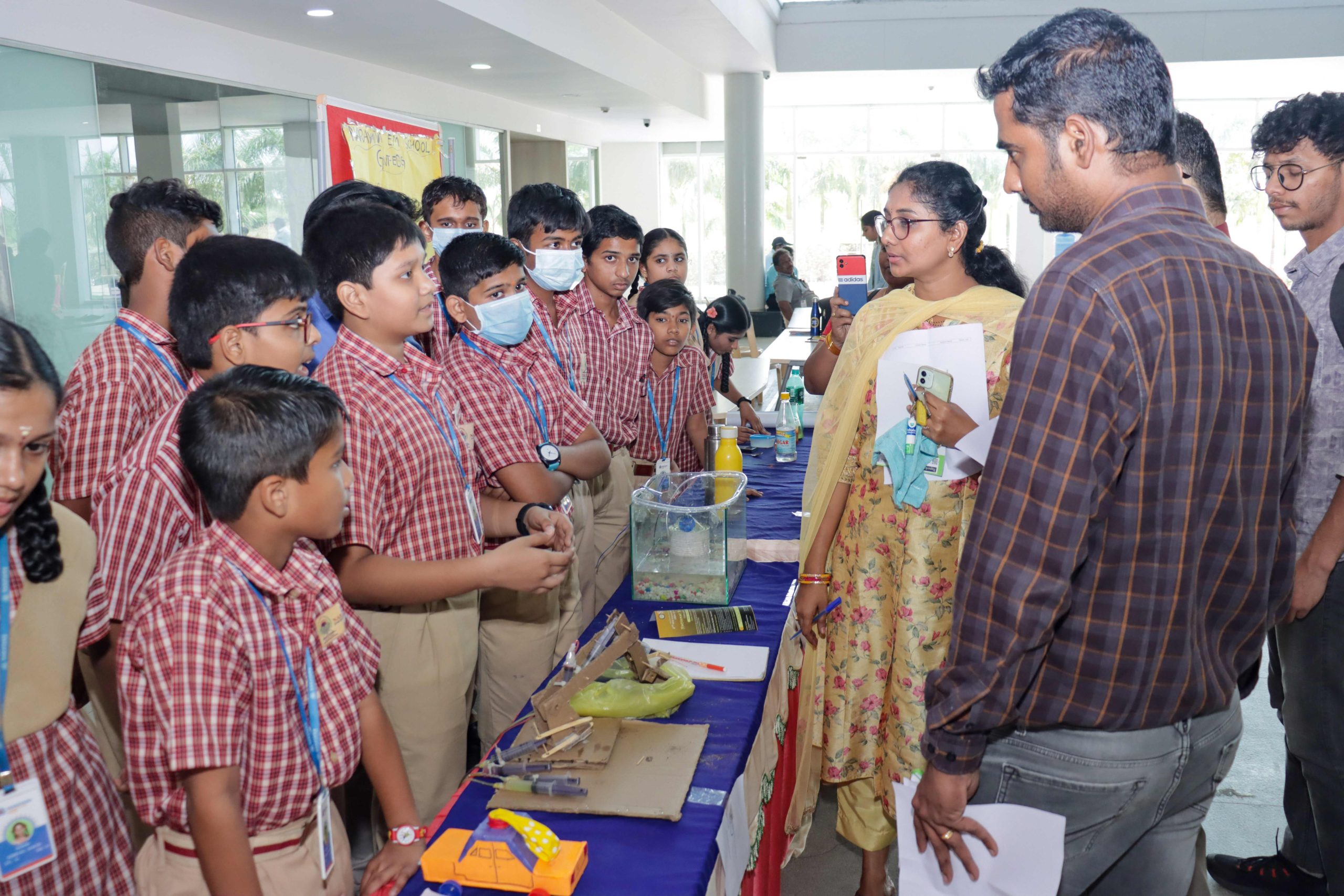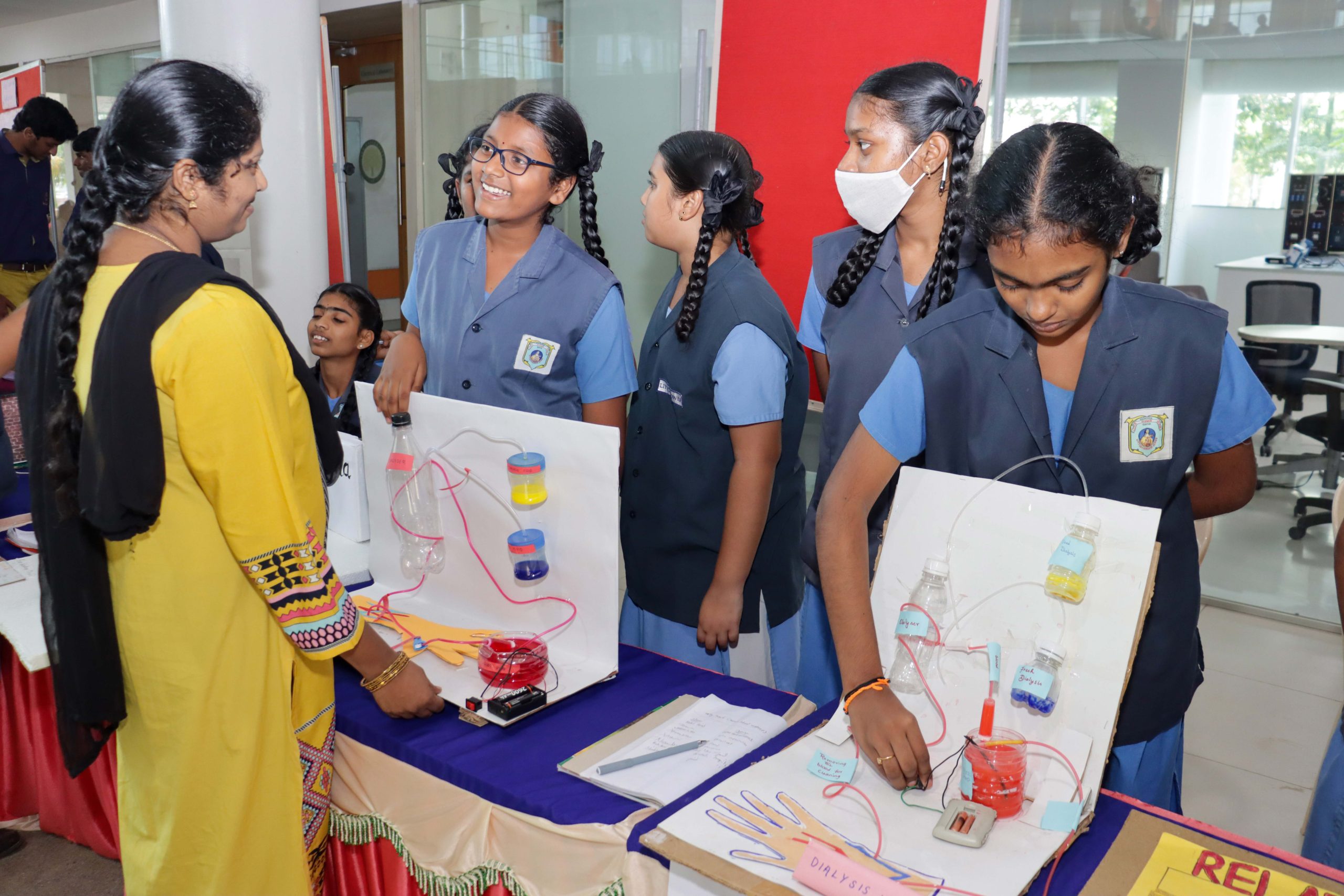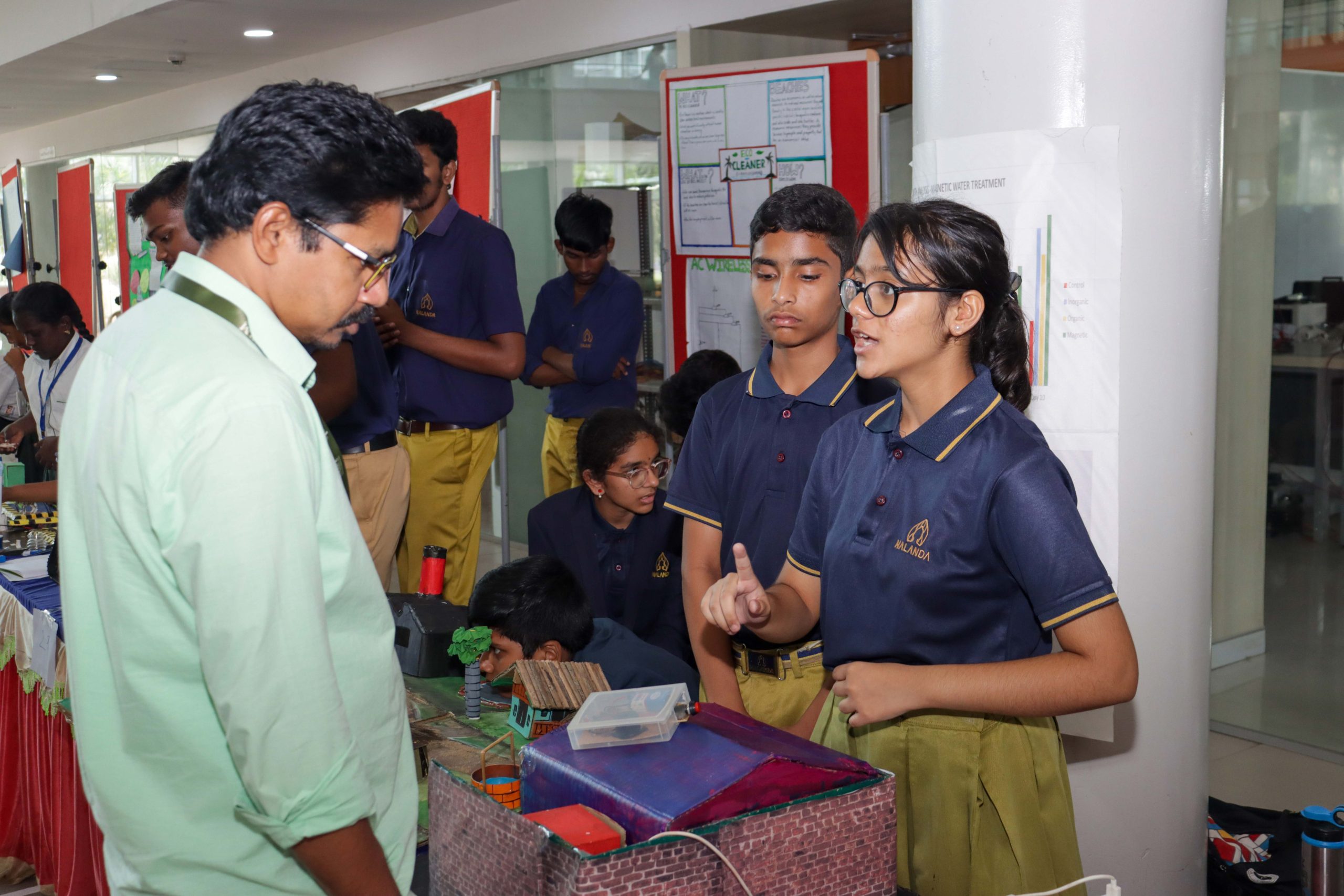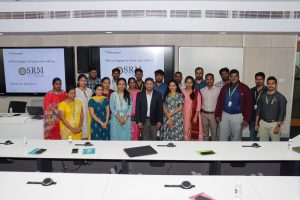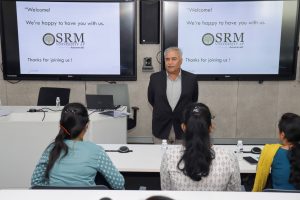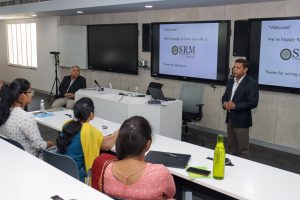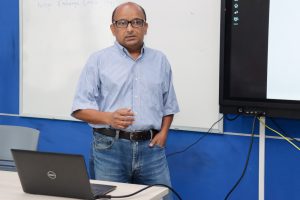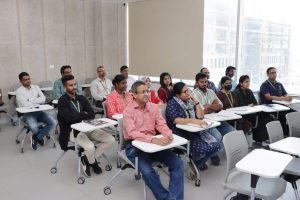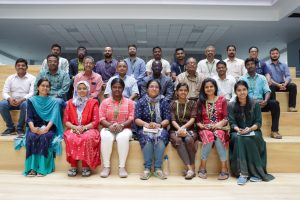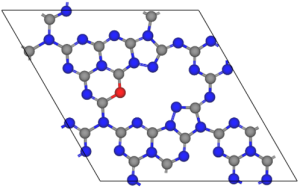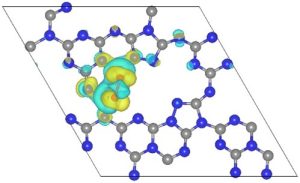All Management Events
- Global Science for Global Wellbeing: National Science Day at SRM University-AP February 28, 2023
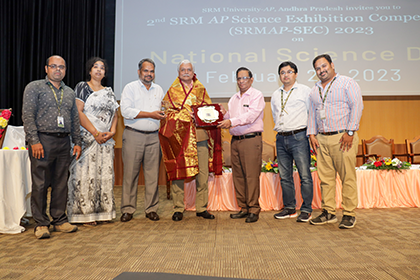
SRM University-AP celebrated National Science Day on Tuesday, February 28, 2023, to promote scientific temper and encourage scientific development in the country. National Science Day is celebrated annually on February 28th to honour the discovery of the Raman Effect by Indian physicist Sir C V Raman, who received the Nobel Prize in 1930 for his discovery. Dr Mukhesh Tripathi, Director, AIIMS, Mangalagiri, inaugurated the celebrations at SRM University-AP.
“Technology may die with you in the textbooks, classrooms and laboratories if not developed further for the benefit of common people, “said Dr Mukhesh Tripathi as he addressed the students and elaborated on how research should be made applicable to advancing humankind. Prof. D Narayana Rao, Pro-Vice-Chancellor of SRM AP, delivered the welcome address. He requested the Chief Guest to establish a Centre of Excellence for AI in Drug Development at SRM AP. Prof. Ranjit Thapa, Dean-School of Engineering and Sciences, SRM AP, introduced the Chief Guest. Prof. D Narayana Rao felicitated the Chief Guest with a memento. The dignitaries interacted with the students and answered their queries about recent advancements in science and technology. Dr Vinayak Kalluri, Dean-Academic Affairs, SRM AP, gave the vote of thanks.
The Second SRM AP Science Exhibition Competition (SRM AP-SEC) and a Tour of the Research Laboratories of SRM AP were also held as part of the celebrations. Over 200 students from the neighbouring schools participated in the National Science Day celebrations, and around 43 exhibits were displayed at SRM AP-SEC. Nalanda Vidya Niketan and GEMS school won first place in the senior school category and junior school category of the exhibition competition, respectively. The winners were awarded mementoes and certificates at the end of the ceremony.
Global Science for Global Wellbeing is the theme of this year’s National Science Day as it indicates the purpose of raising public appreciation of the scientific issues in a global context which has a bearing upon global well-being.
Continue reading → - PhD in Electronics and Communications Engineering | SRM University AP February 28, 2023

Have you always wanted to pursue a career in a specialised field? Are you considering getting an MTech degree?
If so, you’re not alone! Many people are looking to specialise in a particular field, and an MTech degree is one way to do it. This blog post will discuss what it takes to pursue an MTech degree and what to expect from this journey
Why an MTech Degree?
Benefits of Pursuing the Most Sought After Career Option
- Knowledge and Expertise in Technical Subjects
An MTech degree offers an in-depth study of a specific technical subject, allowing you to become an expert in your field. By doing MTech, you not only get knowledge about a particular area but also develop strong communication, problem-solving and analytical skills. You become eligible to work in industry and research fields that require technical expertise.
- Successful Career Prospects
With an MTech degree, one can expect better job prospects and salary packages than with other degrees. It also provides the opportunity to learn highly advanced technologies and equip yourself for a successful career in technology-based organisations. With an MTech degree, one can increase job marketability and become more attractive to potential employers.
- Gateway to Higher Studies and Research
An MTech degree opens the door to further studies or research and may lead to better job opportunities. It is an excellent way for those interested in technology to gain knowledge and better understand the field.
- Specialisations in Your Area of Interest
Aside from this, MTech can also allow students to specialise in a particular area or branch of technology and gain expertise. Moreover, it also opens the door to further research opportunities and postgraduate studies.
- Stay Ahead of the Curve
Studying MTech can be highly beneficial for those looking to advance their career or pursue academic goals in the technology field. With an MTech degree, you can stay up to date with the latest technologies and gain valuable knowledge that will benefit your career and personal life. You can stay ahead of the curve and keep up with the rapidly changing technology industry.
Are you looking for a promising MTech Programme?

The Large Umbrella of MTech Programmes
An MTech degree offers a specialised and advanced education that can give graduates an edge in the job market.
- Materials and Manufacturing MTech Programmes
Materials and Manufacturing MTech programmes provide a deep understanding of Materials Science, Materials Engineering, and Manufacturing processes, which can be applied to a wide range of industries.
Graduates with a Materials and Manufacturing MTech degree can access rewarding and well-paying positions in areas such as,
-
- Aerospace engineering
- Automotive engineering
- Biomedical engineering
– that require expertise in materials and manufacturing technology.
The practical knowledge gained from Materials and Manufacturing MTech studies can help develop new materials for use in production pipelines or create innovative manufacturing processes that streamline production times whilst improving quality control, making the Materials and Manufacturing MTech degree beneficial to the individual graduate and employers alike.
- Surplus Opportunities to Work on Research Projects
Pursuing an MTech degree provides opportunities to work on research projects, which can create networking opportunities and help you hone your skills.
For example, Thermal MTech students get to explore the fascinating field of Thermal engineering, such as Thermal design and Thermal analysis.
They also get to work on projects related to,
-
- Thermal energy management
- Thermal systems design
- Thermal control systems.
- The Bright Side of Thermal Engineering
Working on research projects in Thermal engineering can also give students an edge in the industry as it enhances their understanding of Thermal principles and technologies.
Valuable industry experience and essential connections in the Thermal engineering field through their research work.
All these advantages make pursuing an MTech degree worthwhile for those interested in Thermal engineering.
MTech provides invaluable insight into the latest breakthroughs and technologies in your field, helping you stay ahead of the curve.
Studying for an MTech can provide immense advantages for those in the technological field, particularly IoT technologies. Not only does it offer the opportunity to gain higher qualifications and broaden skills, but it can also provide invaluable insight into the latest IoT breakthroughs and technologies, helping students stay ahead of the curve.
- The Perks of an MTech in VLSI
An MTech in VLSI will allow you to develop advanced knowledge and skills, making a VLSI engineer highly sought after in many industries. As a VLSI engineer, you can work with hardware design, device fabrication, circuit design and debugging, amongst other skills, which will give you a competitive edge over other job applicants.
- Possibilities of the Internet of Things (IoT)

IoT (Internet of Things) related coursework provides students with comprehensive technical and practical insight into IoT systems development. Technical topics like IoT architecture, IoT standards and IoT security are taught in detail, enabling those who complete the program to gain specialised knowledge in the IoT domain.
Furthermore, the programme also typically offers a research-based thesis which enables students to apply their IOT skills to real-world problems. In this way, MTech programmes provide an excellent opportunity for students to understand IoT systems and technologies deeply.
What to Expect From an MTech Degree?
-
- Opportunity to develop their professional skills through hands-on projects and internships
- Opportunity to become experts in Data Science and its associated technologies.
- Data Science is a rapidly evolving field, and an MTech will provide the guidance needed to stay current and be at the forefront of Data Science development.
- Provides students with the ability to gain a deeper understanding of Data Science and its applications, which can help them get better jobs or progress their careers.
Where Will You Be After graduation?
Upon graduation, MTech graduates are highly sought after in the job market, with many top companies offering competitive salaries for those with an MTech degree.
Furthermore, an MTech degree is a tremendous advantage as Thermal graduates are highly sought after in the job market.
Thermal graduates have specialised knowledge, making them more attractive to companies and often offered competitive salaries.
An MTech degree provides Thermal graduates with unique skills and qualifications that make them stand out in the job market and ensure they have a competitive advantage over other applicants.
Making the Most of Your MTech Degree; Yes That’s What Makes the difference!
With an MTech degree, you can pursue a plethora of career options.
What are the Most Coveted Career Options After MTech?
-
-
- Engineering
- Research and development
- Data science
- Materials and Manufacturing
-
- The Scope of Materials and Manufacturing
Materials and Manufacturing are two areas often explored in an MTech course.
-
-
- Provide you with knowledge of materials used in industries and hands-on experience working with them.
- Access to other related fields, such as chemical engineering and robotics.
- Enable you to develop expertise in manufacturing processes, including production planning, cost control and product design.
- On completing the degree, you can embark on a career as a Materials and Manufacturing Engineer with high growth prospects.
- Exclusive job opportunities in the government sector.
-
- The Future of MTech in VLSI
MTech in VLSI empowers students to get VLSI-related roles in the government and even industries like Aerospace, Medical electronics, Automotive industry, etc.
VLSI has become a popular technology due to its versatility in processing large amounts of data without lags. With the proper knowledge and specialised skillset gained through the course, you will be able to face the challenges of a competitive job market more confidently.
What is Stopping You From Grabbing That MTech Degree!
Pursuing an MTech degree can be a rewarding experience. It is an opportunity to gain the skills and knowledge needed to pursue specialised careers in your field of study.
With a vast range of opportunities that come with gaining an MTech degree, it is worth considering if you’re looking for specialised training and education.
With hard work and dedication, you can find great success in your chosen career after completing your MTech degree!
You are just a click away from pursuing your dream MTech Degree!
Continue reading →Education Jagat
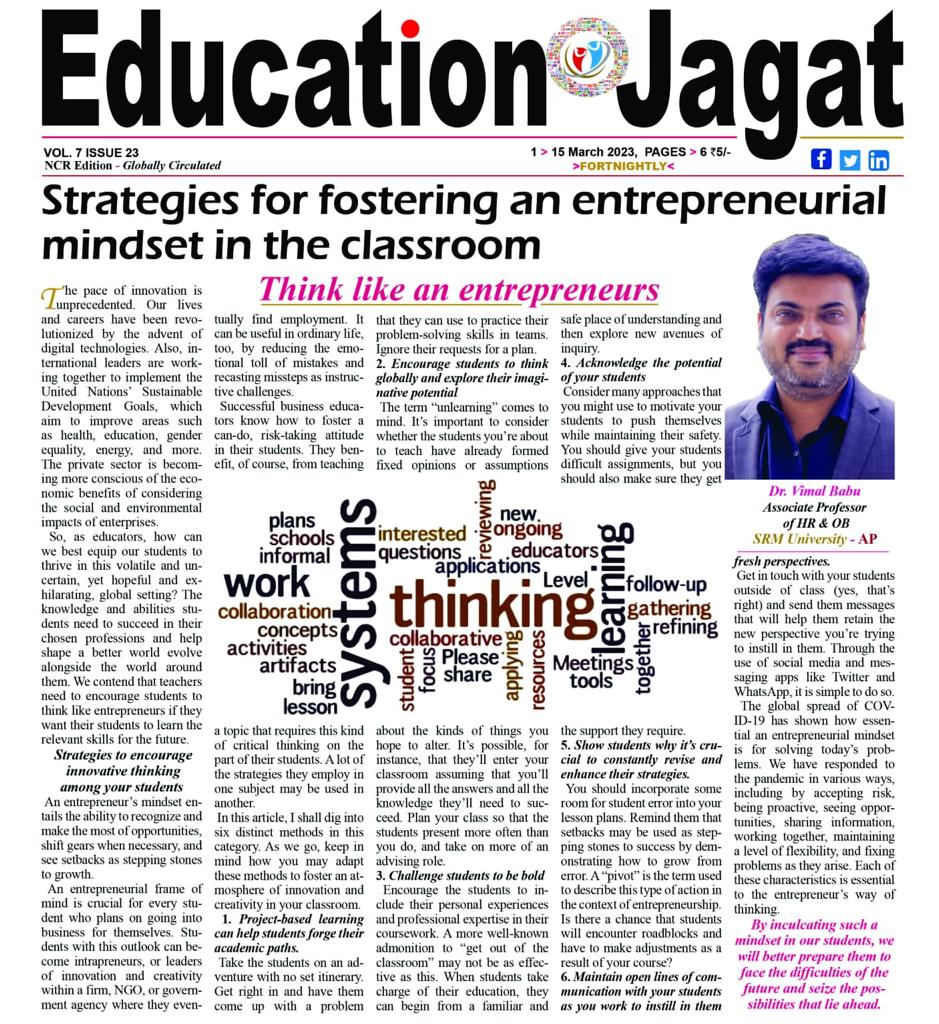
The Academic Insights
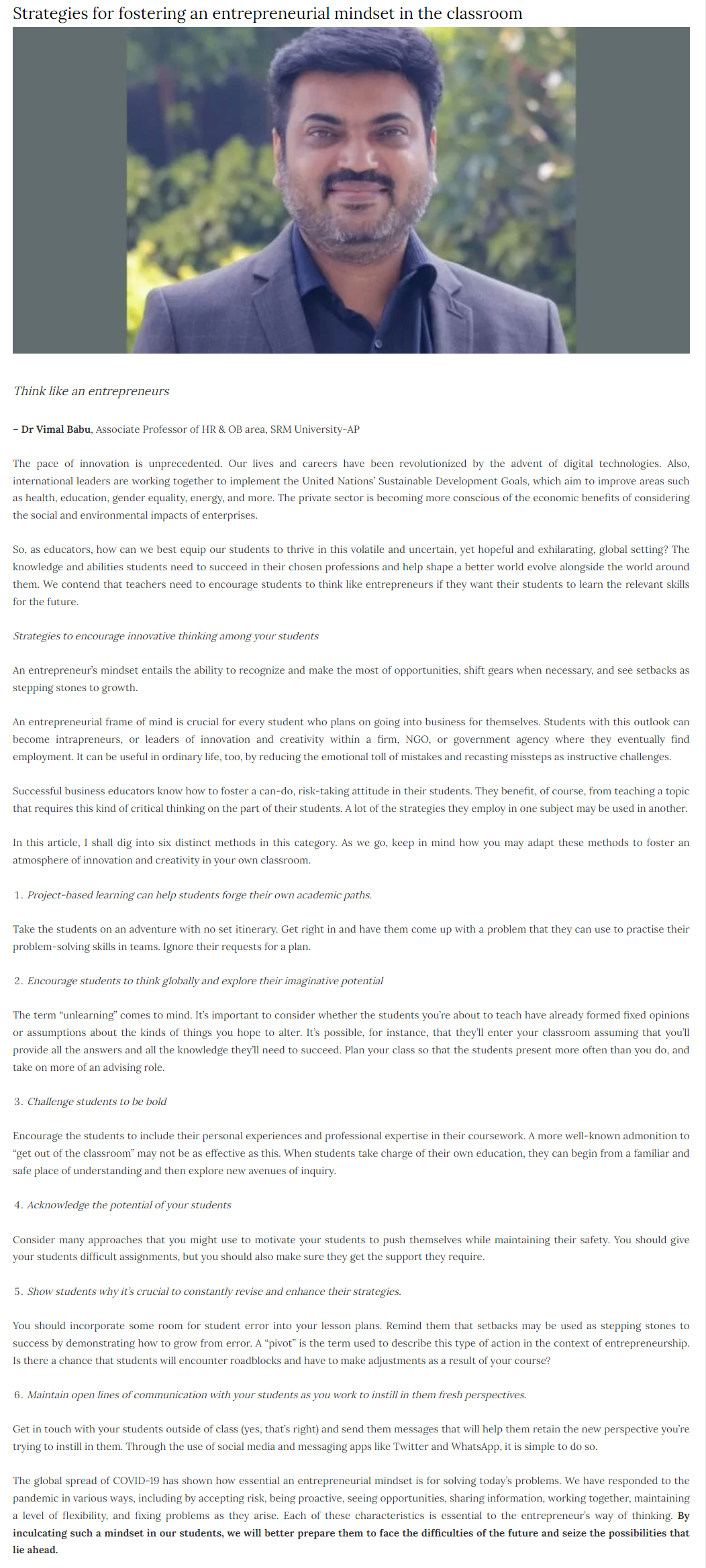
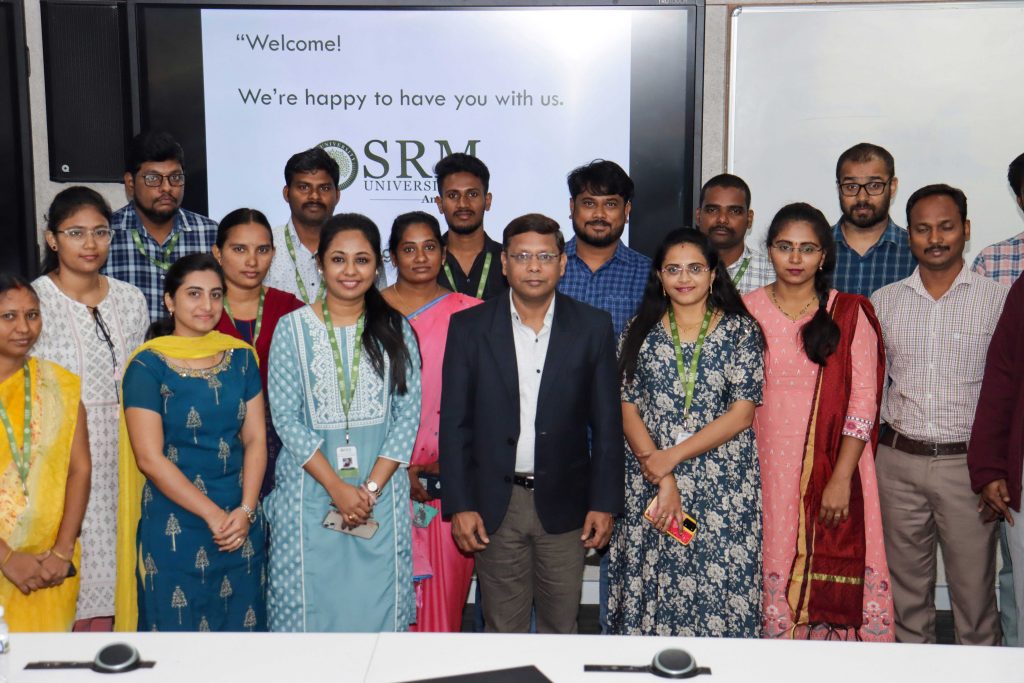
The Directorate of Human Resources of a leading tertiary institute such as SRM University-AP plays a significant role in various duties including the employment of professors, educational specialists and support staff, and auxiliary personnel such as administrative assistants and maintenance workers, performing human resource management, conducting interviews and employee orientations, administering employee benefits among others. Recently The Directorate of HR organised a New Employee Induction Programme on February 20, 2023, facilitating a smooth transition of new joiners into the constructive working environment of SRM AP. A team comprising of Ms Surekha P, Mr B V S Anvesh, Mr Satish and Mr Riaz organised and conducted the programme with the support of the Directorate.
The new joiners were welcomed by the HR representative and presented with a welcome kit. The induction process including the collection and cross-checking of the joining documents and the creation of employee email Id, employee code, HR service login in ERP and temporary Id card followed this. The new joiners were then introduced to the heads of the institution, Vice Chancellor, Registrar, Deans and their respective HODs. Lunch and a campus tour were also provided by the HR team. A detailed overview of the university, SRM University-AP, SRM group, schools, departments, institution policy, HR policy, transportation and residential facilities were also given. The Directorate of Numan Resources has organised the Induction programme to ensure conducive support to new joiners to help them settle into the university seamlessly.
Continue reading →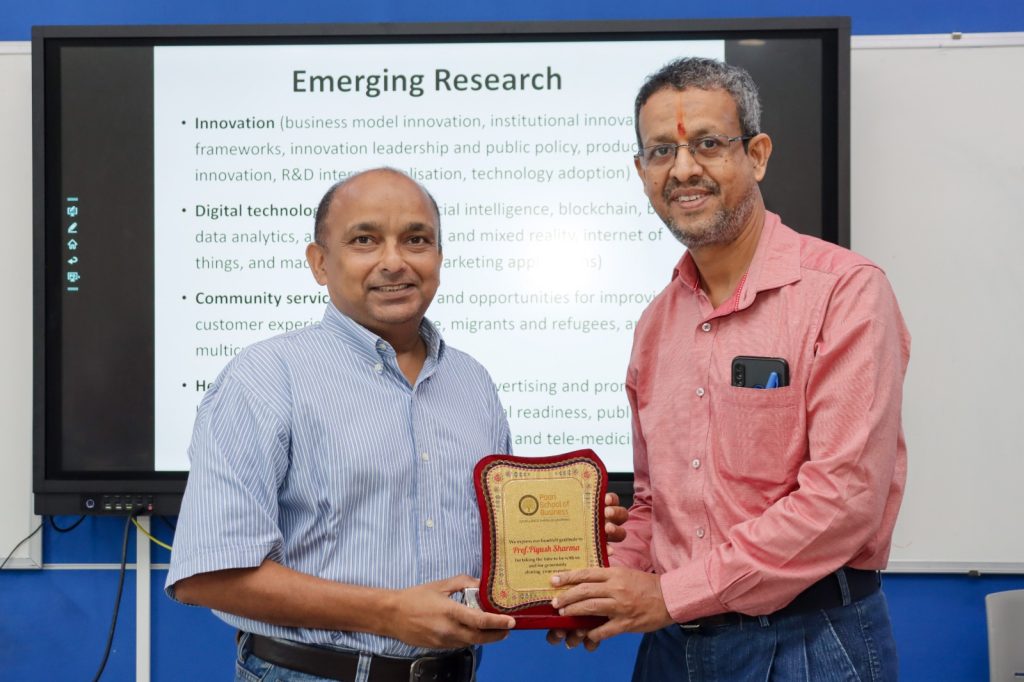
The Paari School of Business prioritises top-tier knowledge acquisition in business and management studies collaborating with renowned academicians, business tycoons, entrepreneurs and researchers to guarantee a premier management learning experience. Engagement with experts in the domain fortifies the significance of networking and research in the evolving business market. On this note, the Paari School of Business organised a Research Talk by John Curtin Distinguished Professor Piyush Sharma on February 13, 2023. The noted academician expounded on “My Research Journey and Emerging Research Interests in Marketing” and engaged in an interactive session with the faculty members and research scholars of the school. In his session, Professor Sharma provided insights into the emerging research interests in marketing and the audience had the opportunity to discuss the impressive and impactful research journey of the distinguished professor.
About the speaker
Professor Piyush Sharma has over thirty years of professional experience, divided almost equally between industry and academia. He is currently affiliated with the School of Marketing at Curtin University, Australia and also serves as a member of the Editorial Review Boards for several esteemed journals, including the Journal of International Business Studies, the Journal of the Academy of Marketing Science, the Journal of Service Research, the European Journal of Marketing, the Journal of Service Theory and Practice, the International Journal of Emerging Markets, the Journal of Creative Communications, and the Journal of Indian Business Research.
Professor Sharma is ranked among the top 2% of researchers in the world across all fields of research and ranked among the top 60 business researchers in the global P-rankings based on publications in ABDC journals since 2013. His research covers services and international marketing, cross-cultural consumer behaviour, self-regulation and regulatory failure, branding and marketing strategy, marketing-finance interface, organisational behaviour and management, among others.
Continue reading →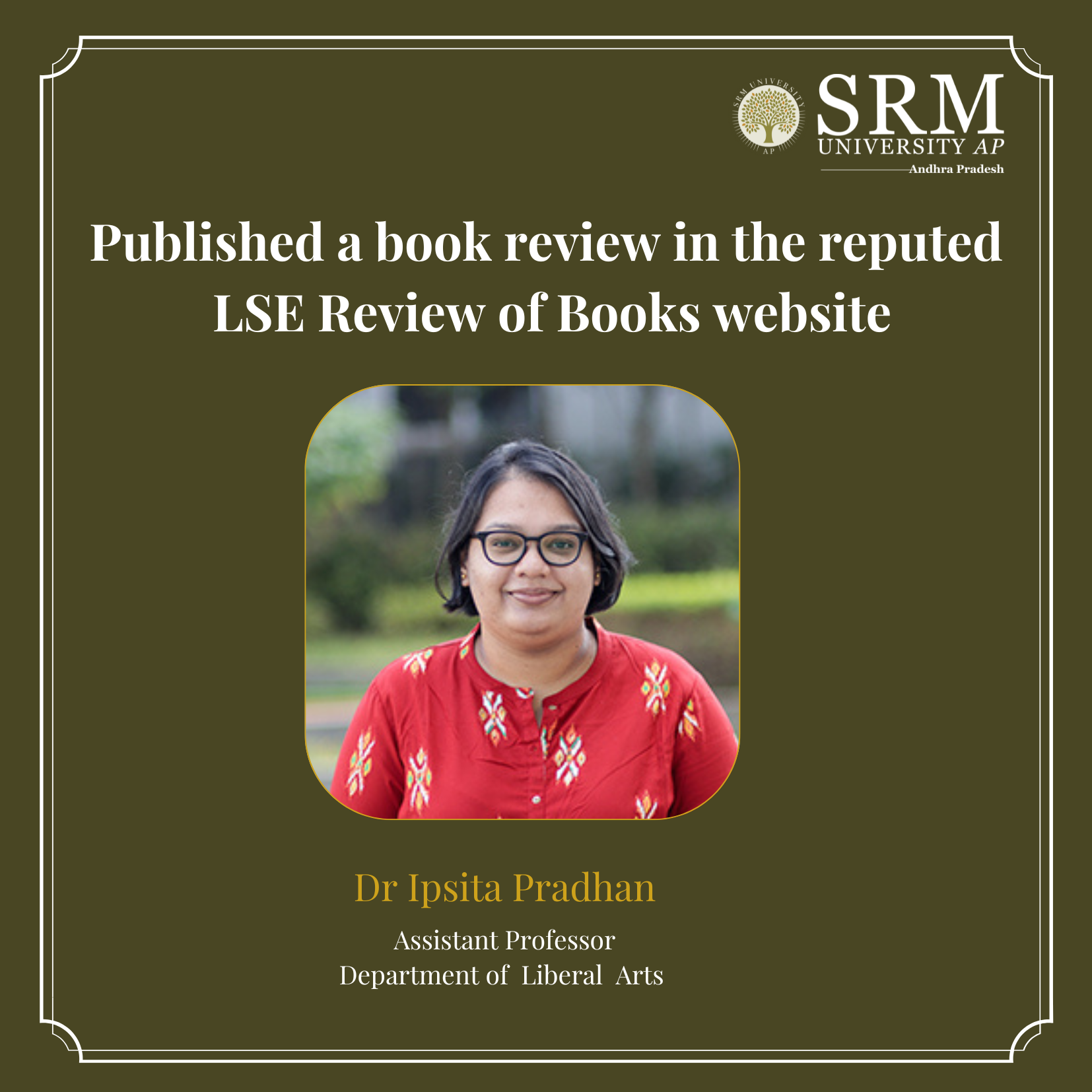 Assistant Professor Dr Ipsita Pradhan, Department of Liberal Arts, has recently published a book review on the renowned LSE Review of Books website. In her recent review, Dr Pradhan offers insightful perspectives on the book Confidence Culture by Shani Orgad and Rosalind Gill. This crucially important book appeals to media studies, American studies, and feminist scholars, as well as a wide public audience.
Assistant Professor Dr Ipsita Pradhan, Department of Liberal Arts, has recently published a book review on the renowned LSE Review of Books website. In her recent review, Dr Pradhan offers insightful perspectives on the book Confidence Culture by Shani Orgad and Rosalind Gill. This crucially important book appeals to media studies, American studies, and feminist scholars, as well as a wide public audience.
Dr Ipsita Pradhan elaborates on how the book assures that self-love affirmations in contemporary times are not free from the disciplinarian gaze of the market and its neoliberal capitalist mechanisms, as it is often measured through one’s productivity. She commends the authors’ rigorous research and compelling arguments, stating that the book offers a much-needed critique of the prevailing cultural narrative around confidence.
“In Confidence Culture, Shani Orgad and Rosalind Gill explore the demands that the cultural imperative of confidence particularly places on women. Enriched by abundant examples drawn from across popular culture to show how ‘confidence culture’ puts the onus on individuals to navigate and solve systemic problems, this book is necessary reading for scholars of gender, media studies and sociology”, writes Dr Ipsita Pradhan.
LSE Review of Books publishes daily reviews of academic books across the social sciences. It aims to facilitate the sharing and exchange of knowledge between experts within and outside the academy and to open up academic research to increase its impact. LSE Review of Books is a forum to encourage engagement with the latest academic publications across the social sciences and the humanities.
Click to read the full book review!
Continue reading →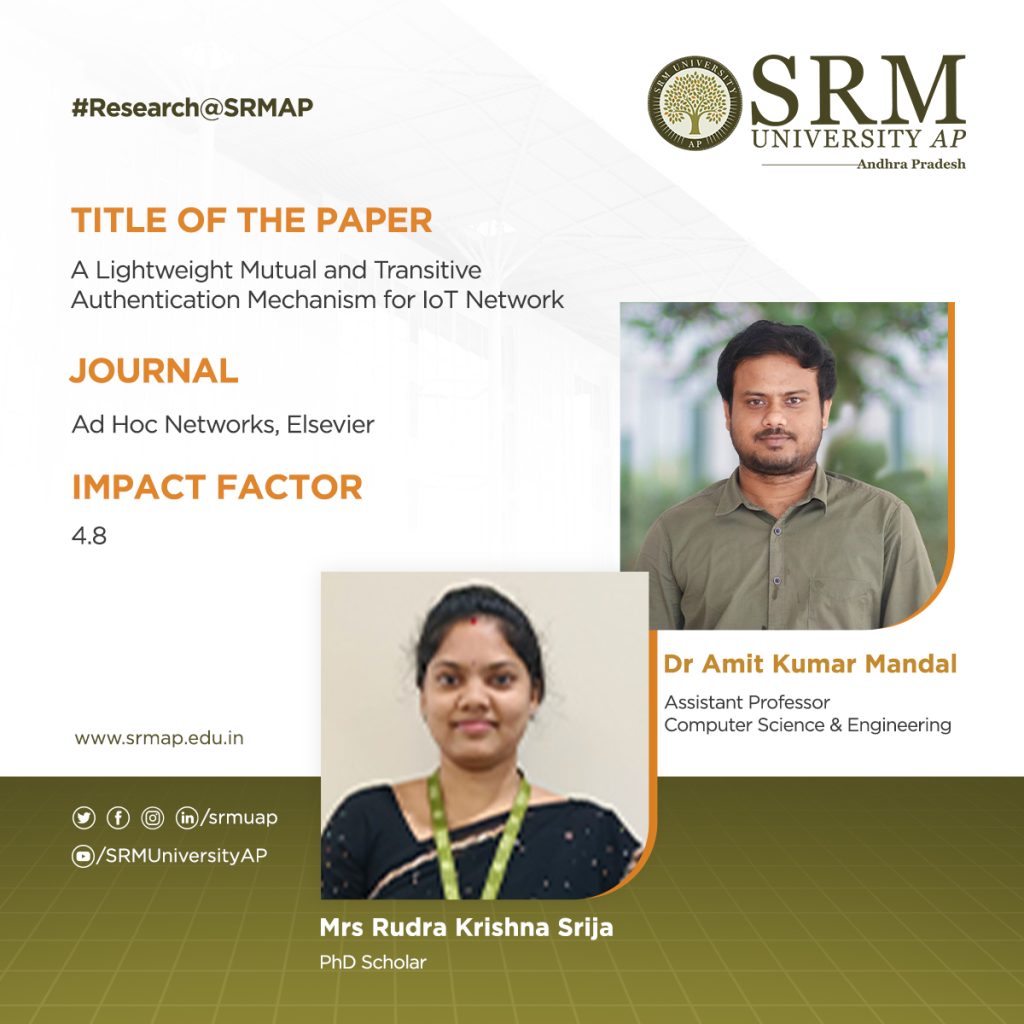
Complex IoT networks comprise multiple devices connected to the gateway. A smoother functioning is ensured through new techniques for device authentication to the gateway. On this note, the research paper titled “A Lightweight Mutual and Transitive Authentication Mechanism for IoT Network” has been published by Dr Amit Kumar Mandal, Assistant Professor, Department of Computer Science and Engineering and his research scholar Mrs Rudra Krishna Srija in the Q1 Journal Ad Hoc Networks, Elsevier having an impact factor of 4.8. The research details the use of the polynomial-based protocol in enhancing device connection for transitive communication.
Abstract of the paper
In large and complex IoT systems like the smart city or smart industry which consist of thousands of connected devices, it may not always be feasible to be directly connected to the gateway but it may be possible to be connected to another device. Therefore, already authenticated devices should facilitate the new device’s authentication by the gateway. To address this issue, the existing protocols use multiple authentication protocols based on different cryptography techniques, which are difficult to implement and manage in resource-constrained IoT devices. In this paper, we propose a Transitive device authentication protocol based on the Chebyshev polynomial.
The work is primarily aimed at improving transitive communication in machine-to-machine communication or device-to-device communication in large-scale heterogeneous IoT network scenarios. The research team targets to investigate the benefits of adopting the designed protocol in particular within low-power and lossy networks in the future.
Collaborations
Università Ca Foscari Venezia, Venice, Italy
Continue reading →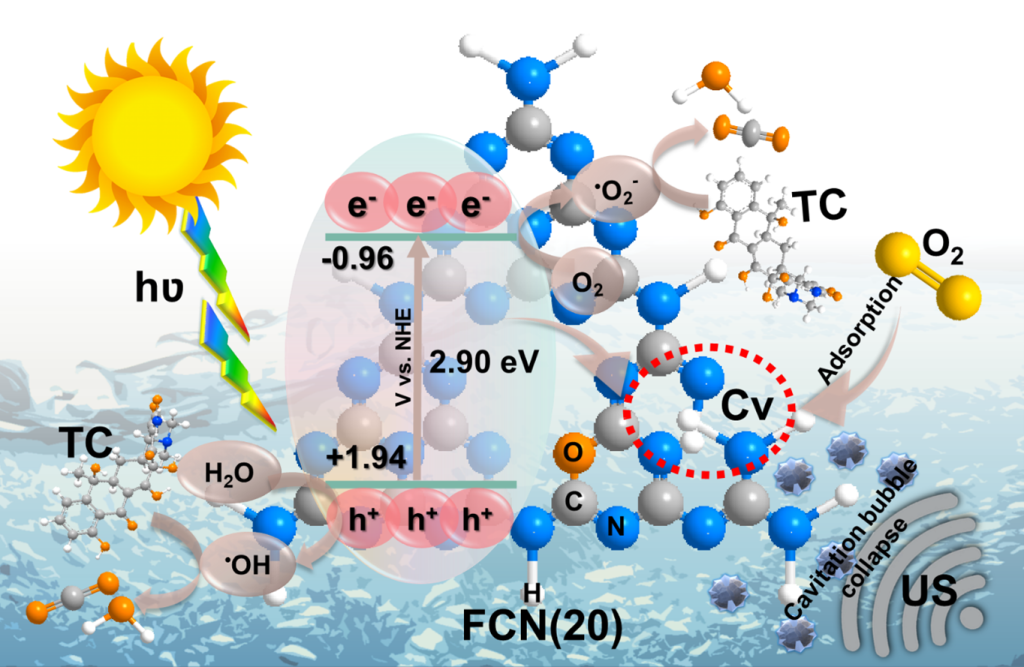
The Department of Physics is pleased to announce that Professor Ranjit Thapa, Dean-School of Engineering and Sciences (SEAS) and Professor of Physics along with his PhD scholar, Mr E S Erakulan, has published a groundbreaking paper titled “Scrutinizing the Role of Tunable Carbon Vacancies in g-C3N4 Nanosheets for Efficient Sonophotocatalytic Degradation of Tetracycline in Diverse Water Matrices: Experimental study and theoretical calculation” in the prestigious Chemical Engineering Journal with an impact factor of 16.744. The paper offers crucial insights into the role of controllable defects in the sonophotocatalytic degradation of tetracycline (TC) antibiotics from polluted water.
Abstract of the paper
Metal-free polymeric graphitic carbon nitride (CN) materials are robust and stable visible-light-driven photocatalysts that have recently piqued interest in photocatalytic applications. Its photocatalytic performance is restricted remarkably due to moderate oxidation ability and fast charge carrier recombination rate. To address these issues, we engineered carbon-vacant CN (FCN) using a facile formalin-assisted thermal polymerization of molten CN precursor in which the carbon vacancies (C v ) were regulated by altering formalin dosage. Consequently, FCN catalysts revealed C v concentration-dependent sonophotocatalytic degradation of Tetracycline (TC) antibiotics over diverse water matrices. The optimal FCN exhibited complete TC degradation efficiency within 60 min with a synergy index of 1.4, which is approximately 2.6 times higher than that of pristine CN. The enhanced sonophotocatalytic performance was mainly due to the synergistic effect of ultrasound and light irradiation. The C v formation also resulted in enhanced charge carrier transportation and facilitated oxygen adsorption at the C V site of FCN – supported by both experimental study and theoretical calculation. Subsequently, FCN generated abundant reactive active oxygen species including, •O 2 –, as well as indirectly •OH which played a significant role in the degradation pathway and mineralisation of the TC molecules. This study provides insight into understanding the correlation between controllable defects and sonophotocatalytic degradation properties of the self-doped and deficient FCN.
In this research, Prof. Thapa and his team utilised a facile formalin-assisted thermal polymerization technique to fabricate metal-free polymeric graphitic carbon nitride (CN) materials. These materials have been gaining increasing interest as photocatalysts, although their photocatalytic performance has been restricted due to moderate oxidation ability and fast charge carrier recombination rate. To address these issues, the researchers engineered carbon-vacant CN (FCN) by regulating carbon vacancies (Cv) with formalin dosage. The optimal FCN catalyst exhibited complete TC degradation within 60 minutes with a synergy index of 1.4, which is approximately 2.6 times higher than pristine CN.
Emerging pollutants, such as antibiotics discharged from pharmaceutical companies, have detrimental effects on living organisms and can cause drug resistance through gene transmission. The removal of TC from water requires efficient and sustainable strategies. A detailed understanding of the synergistic effects of the defect and self-doped CN in sonophotocatalytic degradation could pave the way for the destruction of various recalcitrant pollutants in an aqueous environment.
Collaborations
- Ms Mani Preeyanghaa, Department of Physics and Nanotechnology, SRM Institute of Science and Technology, Kattankulathur, Chennai.
- Prof. Bernaurdshaw Neppolian, Department of Physics and Nanotechnology, SRM Institute of Science and Technology, Kattankulathur, Chennai.
Overall, the research presents exciting possibilities for future projects in the field of sonophotocatalytic degradation and provides a significant contribution to the scientific community’s understanding of controllable defects in CN materials.
Continue reading →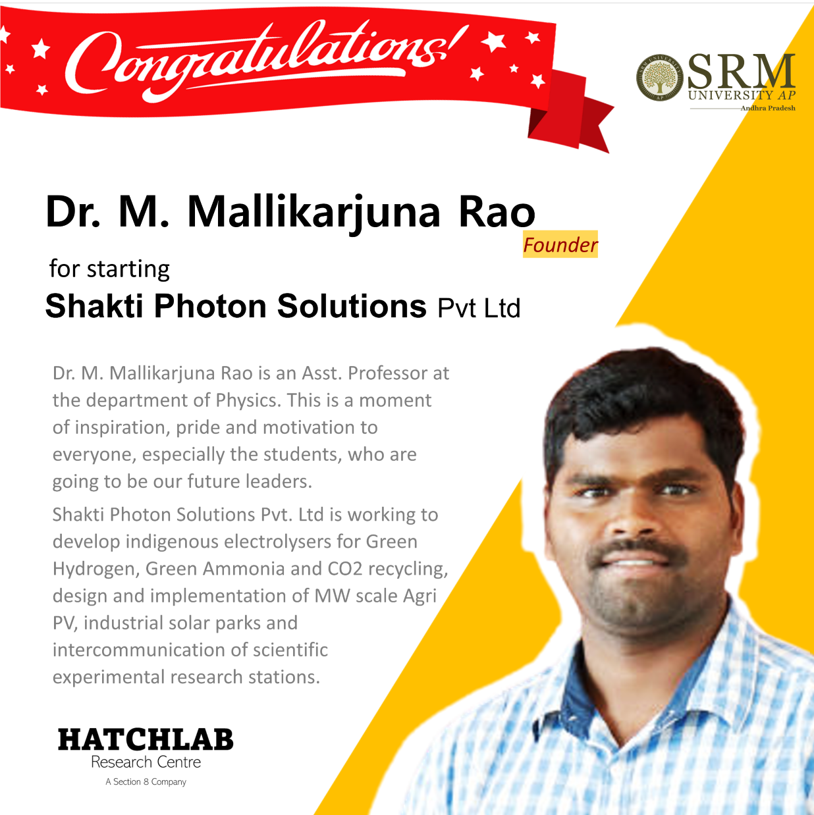
SRM University-AP manifests a supportive ecosystem for entrepreneurial ventures and start-ups with high potential from our ingenious students and faculty. The most recent faculty-led venture accomplishment was by Dr M Mallikarjuna Rao, Assistant Professor, Department of Physics who has established his very own start-up enterprise, Shakti Photon Solutions Pvt Ltd. The Hatchlab Research Centre and the Directorate of Innovation and Entrepreneurship had imparted unrelenting support to Dr Rao in materialising his inventive idea into actuality.
Shakti Photon Solutions Pvt. Ltd aims to develop Indigenous electrolysers for Green Hydrogen, Green Ammonia and CO2 recycling, Design and implement MW scale Agri PV, Industrial solar parks and Intercommunication of scientific experimental research stations. The venture has successfully completed the prototype phase and is ready for commercialisation and production.
Kudos to our faculty champions for their effort and dedication to great ventures with huge potential and for inspiring budding entrepreneurs to achieve success!
Continue reading →


